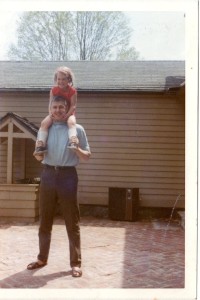 It’s been nearly thirty years since my father died of prostate cancer. Time has made his absence normal. And with the distance of years, I catch myself wondering if my father is a just story I tell myself. But then I have the comforting reminder that he is in so much of who I am and what I do. It is, for instance, my father and his death that has prompted the work I do now and is a good portion of why I believe in its importance.
It’s been nearly thirty years since my father died of prostate cancer. Time has made his absence normal. And with the distance of years, I catch myself wondering if my father is a just story I tell myself. But then I have the comforting reminder that he is in so much of who I am and what I do. It is, for instance, my father and his death that has prompted the work I do now and is a good portion of why I believe in its importance.
A year before my father died, shortly before I was to return to England, where I lived at the time, he and I sat on his deck in Marion, Massachusetts, overlooking the harbor, which was bathed in a late summer light. There, my father, looking remarkably well for someone whose cancer had metastasized into his bones, told me everything a child wants to hear from their parent–that he loved me and was proud of me. These were things I knew, but had never heard him say so directly, with such deliberateness. A few months later a letter arrived to me in England in which he expanded on his feelings about me. And though I would see him again, it proved to be his goodbye.
When I returned to the States the next summer, it was a shock to find the frail man who had replaced my energetic father. It was then that I began my letter to him, the letter that signaled my acceptance of the fact that my father not only would die but needed to die to relieve his suffering. It was–as you can imagine–a hard letter to write. It was also the first time I revised a piece of writing, rather surprising given that I was an English major in college. Well worth the effort, this writing helped to ease an incomprehensible farewell when I again left for England, my father still alive but wanting me to go, to get on with my life instead keep vigil by his deathbed.
From time to time, I take these exchange of letters out of my fire safe and reread them. I’m thankful, of course, to still have my father’s words to me. But I am also thankful to have the words of my twenty-seven-year-old self, telling me now what my father meant to me then, reminding me at fifty-six that my father is, indeed, not just a story I tell myself.
Writing, my father showed me is vital–it’s the opportunity to say what should be said while there’s still time. It’s a means of figuring out what we think and feel; a way of processing our experiences and feelings. It’s a chance to heal. And as a record of our lives, it helps us take measure–of what’s lost and what still matters.

Thanks for the share!
Nancy.R
Thank you for reading, Nancy!
Best,
Rebecca
Rebecca,
Thank you so very much for your personal generosity in sharing those incredible pieces you are currently care taking. Be sure your journey includes passing it along to the next in line, the soul of the original writer will heighten the senses of the reader and strengthen the bond.
Sante,
Thank you for your comment! I very much enjoyed meeting you. Your enthusiasm is infectious. I know you’ll keep sharing your passions in writing, so I’m just going to send you good energy.
All the best,
Rebecca
“I’m thankful to have the words of that twenty-seven year old telling me now what my father was to me then.”
Thank you so very much Rebecca for your story about the importance of writing our stories down, how the process clarifies, heals, and teaches — and so much more.
Much ki!
Judy